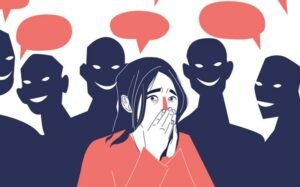If you are one of the many people who suffer from ROCD, then you know how debilitating it can be. You may feel like you are going crazy and that there is no cure. Well, we have some good news for you! There is the ROCD cure, and in this blog post, we will discuss the symptoms and treatment options available to you. Keep reading to learn more!
Contents
What Is ROCD?

ROCD stands for Relationship Obsessive Compulsive Disorder. It is an obsessive-compulsive disorder in which the person feels compelled to constantly question the validity of their relationship, or even break it off due to doubts about their partner’s feelings and motives. This can lead to severe anxiety and depression, damaging the relationship even further. The signs of obsession and compulsion in this disorder are:
- Doubts, worries, and intrusive thoughts about the relationship.
- Constant checking of one’s partner’s behaviors and interactions with others.
- Fear of being permanently wrong about the relationship.
- Thinking that one’s partner is not good enough or the “perfect one”.
- Replaying conversations and events in their mind to ensure accuracy.
- Obsessively seeking reassurance from their partner.
- Persistent intrusive thoughts about the relationship Fear of making a mistake or that one’s partner is not “the one”
- Feelings of guilt and shame for not being good enough or for not loving their partner adequately.
- Anxiety and depression due to obsessive thoughts about the relationship Avoidance of situations or conversations that may trigger worries about the relationship
- Constant checking of one’s partner’s behaviors and interactions with others Seeking excessive reassurance from their partner
- Feeling like their partner is not “the one” Perfectionism to make sure that the relationship is perfect
- Difficulty in focusing on other activities because of preoccupation with doubts.
Does Relationship OCD Go Away?
There is not any single, definitive answer to this question as everyone’s experience with ROCD is unique. Some people may find that their symptoms improve over time and with the help of psychotherapy, medication, or both. Others may find that, despite their best efforts to manage their disorder, they still struggle with intrusive thoughts and feelings of doubt.
What Are The Cure For ROCD?

Here we have suggested ROCD cure. Some of them are mentioned:
Cognitive Behavioral Therapy (CBT)
CBT is a form of psychotherapy that is designed to help people learn how to recognize and change their negative thought patterns. The goal of CBT is to help people become more aware of their thoughts, feelings, and behavior so they can manage them better. This type of therapy may be helpful for people with ROCD because it can help them identify their irrational beliefs and work towards changing them.
Exposure Response Prevention (ERP)
This is a form of cognitive behavioral therapy that helps people confront the things they are afraid of instead of avoiding them. People with OCD often try to avoid situations or activities that trigger their obsessions, but ERP encourages them to face these triggers head-on in order to overcome the anxiety they experience when faced with them. This type of therapy is designed to help people learn how to tolerate uncertainty and discomfort without resorting to compulsions or avoidance behaviors.
Acceptance and Commitment Therapy (ACT)
This type of therapy is similar to CBT, but it focuses more on acceptance than changing thoughts or behaviors. It encourages people to accept their experiences, including the discomfort and distress that comes from ROCD. This can help them confront their fears without avoidance or compulsions and learn how to live with uncertainty in a healthy way.
Medication
Medication is sometimes used to treat ROCD. Antidepressants, anti-anxiety medications, and other types of psychotropic drugs may be prescribed by a doctor or psychiatrist. These medications can help reduce symptoms such as anxiety and depression in order to make it easier for people to engage in therapy.
Mindfulness
Mindfulness is another type of therapy that encourages people to focus on the present moment and accept their experiences without judgment. It can help people with ROCD become more aware of their thoughts and feelings, so they can better healthily manage them. Mindfulness activities, such as meditation and yoga, can help people gain more insight into their thoughts and learn how to respond to them in a healthier manner.
Self-Help Strategies
There are also some self-help strategies that are beneficial and considered as a ROCD cure. Keeping a journal can be helpful to track your thoughts, feelings, and behaviors. Practicing mindfulness exercises can help you become more aware of the present moment instead of getting stuck ruminating on obsessive thoughts about the relationship. Making sure to get enough sleep and exercise and eating a balanced diet are also important for keeping yourself healthy mentally and physically.
There are also some self-help strategies that may be helpful for those struggling with ROCD. These include:
- Practicing relaxation techniques such as deep breathing or progressive muscle relaxation
- Keeping a journal to track your thoughts, feelings, and behaviors
- Doing activities that make you happy or provide a distraction from worries
- Avoiding excessive reassurance seeking from friends or family members
- Learning how to tolerate uncertainty by not engaging in compulsive behaviors
- Participating in activities that involve socializing or making decisions.
ROCD Group Therapy

Group therapy is another form of treatment that can be beneficial for managing ROCD. Group therapy provides a safe and supportive environment to share experiences and learn from others who are going through similar struggles. In addition, it gives individuals the opportunity to receive feedback from peers which can help them recognize patterns in their behavior or thinking that perpetuate distress.
Transcranial Magnetic Stimulation (TMS)
Transcranial Magnetic Stimulation is an emerging ROCD cure. It is a noninvasive procedure that uses magnetic fields to stimulate areas of the brain associated with OCD. This form of therapy has been found to be effective in reducing symptoms of OCD, including intrusive thoughts and compulsive behaviors related to ROCD.
How Do I Get Rid Of ROCD?
ROCD is a complex disorder, so it’s important to seek professional help from a mental health provider. With the right treatment plan and dedication, it is possible to manage ROCD and lead a healthier life. Psychotherapy, medication, mindfulness practices, self-help strategies, and group therapy may all be helpful in treating ROCD.
Self-help strategies can help you manage ROCD. These strategies include learning to challenge intrusive thoughts, doing exposure exercises, and accepting uncertainty.
To challenge intrusive thoughts, try cognitive restructuring or cognitive reframing. This involves questioning the thought’s accuracy and reality. Ask yourself if it is based on fact or emotional reaction. Once you recognize that the thought is distorted or exaggerated, you can replace it with a more realistic one.
Exposure exercises are another way to cope with ROCD. These can help you learn to tolerate anxiety and reduce its effects on your life. You can do this by deliberately engaging in activities that trigger uncertainty and obsessions. For example, if you have doubts about your relationship, you can practice sitting with the uncertainty until it becomes less intense.
Conclusion
ROCD can be a difficult and distressing condition to manage, but it is important to remember that there are treatments available. Cognitive-behavioral therapy and medication are both effective ways of managing ROCD. Additionally, self-help strategies such as journaling, mindfulness, relaxation techniques, and developing healthy coping mechanisms can also be beneficial. TMS is an emerging treatment option for those who do not respond well to traditional methods of treating ROCD.
Take care, and don’t forget that you are not alone! OCD is a mental health disorder characterized by obsessions and compulsions. If you have any queries regarding OCD treatment, ERP therapy experienced therapists at OCDMantra can help: Book a trial OCD therapy session


